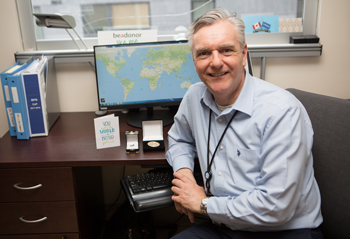Q&A with Kevin Bradley

By Ana Gajic

Kevin Bradley
Kevin Bradley is a living donor co-ordinator in the Kidney Transplant Program at St. Michael’s Hospital. A registered nurse by training, Bradley’s job is to co-ordinate the potential kidney donor and pre-emptive recipient’s work-up processes. He also co-ordinates out-of-country donors, a unique opportunity offered at St. Michael’s.
Tell us about your role in the Kidney Transplant Program.
My colleague and I facilitate the testing for potential living donors. Part of my role is to facilitate donors who come from overseas to donate a kidney to a family member or loved one.
Why is the opportunity of out-of-country donation unique?
Many transplant programs don’t offer out-of-country donation because it can result in little yield. I’m happy to work for an organization that understands the GTA is a multicultural place and that many of our patients who need a kidney donor don’t necessarily have a large network in Toronto to reach out to. When it comes to looking for a donor, their only opportunity may be someone overseas. We believe they should be given that opportunity and all attempts should be made to help facilitate this.
How many countries have you facilitated donors from?
Russia, Myanmar, South Korea, the United Kingdom, the United States, Spain, the Philippines, India, Bangladesh, Pakistan, Venezuela, Somalia and Sudan.
How does out-of-country donation work?
The patient in Canada identifies a friend or family member abroad, and the potential donor initiates contact with us. We then ask for a few formal tests to be done and once we’ve verified that this may work, we ask the family member to come to Canada for a stay of at least three months. Trillium Gift of Life Network also helps with some of the expenses through the Program for Reimbursing Expenses of Living Organ Donors.
What are some of the challenges with facilitating out-of-country donation?
Sometimes, communication can be a barrier. Depending on which country people are from, they also may need a visa, which is always an uncertainty. Once we review everything, we send a letter of support for a visa to help the process.
What has been a surprising aspect of your job?
We try to communicate directly with the potential donor to avoid a conflict of interest. I’ve learned in this role that Google Translate is my friend. I wrote to someone in Tagalog using Google Translate and the potential donor who received the email asked whether I was from the Philippines. So I knew the translation was good!
What’s your favourite part of your job?
I love meeting people from around the world and having the donation come to fruition. Seeing someone get an opportunity for a transplant that they may not have had otherwise is a great gift.
What do you want people to know about organ and tissue donation?
One deceased organ donor can save eight lives and tissue donors can enhance more than 70. It’s a unique gift because not everybody who dies can be an organ donor. I also want people to learn more about living donation. It’s a great opportunity to see your loved one lead a better quality of life.
About St. Michael’s Hospital
St. Michael’s Hospital provides compassionate care to all who enter its doors. The hospital also provides outstanding medical education to future health care professionals in more than 29 academic disciplines. Critical care and trauma, heart disease, neurosurgery, diabetes, cancer care, care of the homeless and global health are among the Hospital’s recognized areas of expertise. Through the Keenan Research Centre and the Li Ka Shing International Healthcare Education Centre, which make up the Li Ka Shing Knowledge Institute, research and education at St. Michael’s Hospital are recognized and make an impact around the world. Founded in 1892, the hospital is fully affiliated with the University of Toronto.
